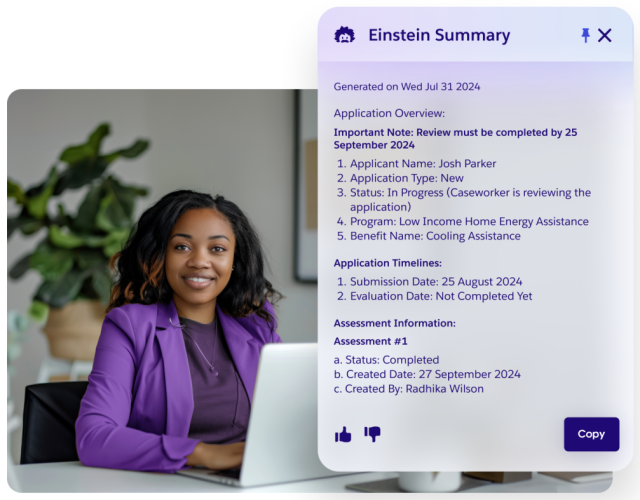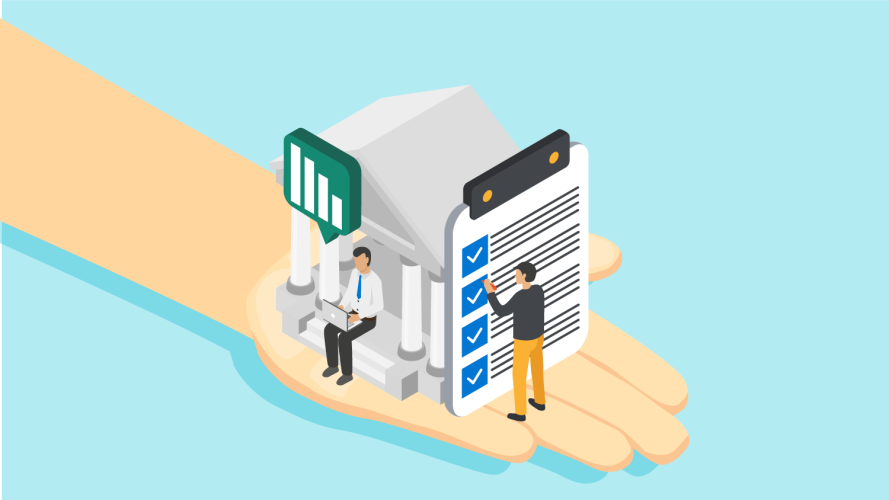5 Must-Know Government Technology Trends in 2025



Salesforce industry experts share their perspectives on the direction of the public sector industry over the next twelve months.
Technology is rapidly transforming how governments operate and engage with constituents. As expectations evolve, governments are under pressure to deliver digital experiences on par with those of private businesses. Our Connected Government Report revealed that 75% of people expect the quality of digital government services to match the best private sector organizations. By 2025, significant technological advancements are anticipated, with over 75% of governments expected to manage more than half of their workloads using hyperscale cloud service providers. While public sector organizations have made significant strides in recent years to modernize their operations and services, there is more to do.
From increased governance around AI to cultivating a more data-centric approach for mission success, here are five key areas where technology will impact the public sector in 2025:
- Governments will prioritize trusted AI governance
- Actionable data and AI insights will drive government decision-making
- Autonomous AI agents will power the proactive government of the future
- The agentic AI future will create new, more specialized roles
- Standardizing security and compliance will be a global effort
1. Governments will prioritize trusted AI governance
One of the most significant trends is the rise of AI and AI-powered autonomous agents. The potential positive impacts are vast but to ensure we reap the benefits of this growing technology, governments will need to prioritize a ‘Trust-First’ approach to AI development. This means they will actively manage risks associated with AI and ensure that this technology is used safely and fairly. To achieve this, governments will collaborate with private sector researchers like they have with the Partnership for Global Inclusivity on AI to influence public policy and regulations. These regulations will be crucial for developing new training programs for government employees, adopting tech-conscious security standards, mitigating AI-driven bias and misinformation, and enhancing public safety. As AI continues to evolve, governments will play a pivotal role in ensuring it is used responsibly. (Back to top.)

Rita Tenan
AVP, Industry Go to Market
2. Actionable data and AI insights will drive government decision-making
Data is foundational to decision-making, but it can only be leveraged if it can be accessed in an efficient way. Organizing, cataloging, and standardizing government data for action presents a significant opportunity for public sector organizations. Many government entities still struggle with integrating siloed, legacy data and balancing innovation with data governance. However, as AI technology advances, the need to effectively use data becomes even more pressing. Governments must rethink their data strategies to unlock their data for action and impact
Actionable data empowers governments to make quick, informed decisions based on real-time analysis. This is especially important when governments face rapidly evolving needs, changing customer expectations, and dynamic events that require agile and proactive responses.
In the coming year and beyond, governments will continue learning more about the value of AI and agent-driven insights and begin to integrate them into their operations and possibly even grow to rely on AI to accelerate their mission.
AI relies on the same data layer as human-driven action, which highlights the importance of data and how it can provide organizations with the context, detail, and nuanced understanding they need to make split-second decisions that benefit their constituents. As data becomes more essential in the flow of government operations, it will drive effective decision-making and improve efficiency and allow organizations to take action. (Back to top.)

Jessica Talbert
Principal Enterprise Architect
3. Autonomous AI agents will power the proactive government of the future
Change is underway. The recognition of the need to empower our public servants with the right tools mirrors the monumental shift we saw more than half a century ago from the computer server room to the personal desktop computer. By anticipating issues and taking action to address them before they arise, AI agents can optimize public sector operations in real time. This proactive approach will enable governments to better serve their citizens and improve overall efficiency. And while autonomous AI will accelerate innovation, humans will still be at the helm, driving the most significant changes.
In the agentic age, we will experience a massive shift in our approach to AI and its ability to propel us into an era of agent-supported government transformation. Soon, autonomous agents will become integral to government service teams everywhere.
Agentic capabilities refer to the capacity of AI to actively reason with a multitude of dynamic inputs and take action once it has reached the best outcome. The agentic future will see agents assigned critical roles integrated into our workforce. Proactive agents, capable of handling complex tasks and delivering real-time solutions to citizens and government employees alike, can act as digital assistants to human workers, carrying out tasks such as autonomously analyzing vast datasets, predicting service needs, and executing tasks like:
- Processing benefits claims and reviewing eligibility applications (with a human involved appropriately involved if decisions are irreversible)
- Responding to citizen inquiries with personalized instructions, and
- Taking action to streamline and optimize complex workflows without manual intervention
Agents’ autonomous capabilities have the potential to enable governments to shift from reactive to proactive service delivery, optimize public sector operations in real time, and drive innovation with humans at the helm. (Back to top.)

Gisele Kapterian
Senior Director, Industry Advisor
4. The agentic AI future will create new, more specialized roles
The public sector workforce is at a turning point, where emerging digital tools and agentic AI solutions are essential for meeting the demands of tomorrow. To keep up with digital and AI-powered solutions, governments will need to rethink their approach to recruitment, re-skilling, and role refinement. This includes a focus on talent recruitment management and the development of new roles to support AI and data strategies. Governments will continue the conversation around re-skilling for relevance, exploring how to rethink talent management from end to end, and creating space for agents as the new essential co-workers.
In 2025, governments will place a greater emphasis on curating roles that shepherd the rapid development of AI, custom agent applications, and data strategies. We’ve seen the beginnings of this with the strategic evolution of Chief Data Officers’ roles and the creation of new roles like Chief AI Officers in government agencies. This motion will continue to proliferate a new class of highly-skilled professionals — AI ethics experts, agent design specialists, AI data architects, and the like — who will ensure the longevity of large-scale investments in digital and AI-powered solutions.
Initiatives like the White House’s national surge for AI talent highlight the growing need for specialized skills in the public sector.
As technology continues to advance, governments will need to adapt their workforce to meet the demands of a digital future. With agents, governments can reimagine their approach to recruitment and talent development. This means moving beyond traditional methods, focusing instead on end-to-end talent management that prioritizes roles aligned with evolving AI and data strategies and re-skilling existing workers so that they are equipped to help agencies drive innovation and meet the demands of tomorrow. (Back to top.)

Nadia Hansen
Director, Local Government Industry Advisor
5. Standardizing security and compliance will be a global effort
In our increasingly interconnected world, data security has become a global concern. The seamless flow of information across borders, driven by cloud computing, e-commerce, and the rise of cybercrime, has blurred traditional geopolitical boundaries. This interconnectedness, while beneficial in many ways, presents unprecedented challenges to security and compliance.
Governments must prioritize comprehensive data privacy management programs that go beyond policies like GDPR, CCPA, and FedRAMP. These policies, while important, were designed for a world where data largely resided within national and regional borders. In the borderless global landscape that governments navigate, harmonizing different legal frameworks, cultural norms, and technological capabilities is a significant hurdle. Furthermore, the principle of data sovereignty, where nations assert control over data generated within their territories, adds another layer of complexity. To address these challenges, governments need to explore the feasibility of developing or adopting global standards like ISO/IEC 27001. Such standards provide the agility to adapt to new regulations as they emerge.
Moreover, taking advantage of AI insights can significantly enhance security profiles. AI can be used to identify patterns in cyberattacks, craft anticipatory action plans, and proactively address vulnerabilities in a dynamic fashion. For example, AI algorithms can analyze network traffic to detect anomalies indicative of malicious activity, predict potential threats based on historical data, and automate incident response protocols.
In 2025 and beyond, we can expect to see an increased willingness from governments to explore and implement more universal approaches to security and compliance. Navigating the complexities of data sovereignty and fostering international collaboration will be critical to success. (Back to top.)

Roderick Bremby
RVP, Global Public Sector Digital Transformation
Modernize your government technology in 2025
As we look to the future, these trends highlight a shift towards proactive government technology. Government agencies will no longer be mere stewards of the status quo but will become architects of a brighter, technologically empowered future. By embracing trustworthy AI and agents, data-driven decisions, new approaches to recruitment, and global security efforts, government agencies can modernize their operations and better serve the public. The year 2025 presents an opportunity for governments to take significant steps towards this future, ensuring they are well-prepared to meet the challenges and opportunities of the digital age.
Future-proof your agency with trustworthy tech
Discover how embracing AI can help you modernize government service and build public trust and connection.
































